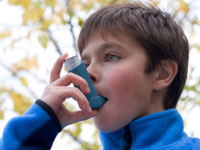
Getty Images
So why do asthma symptoms seem to get worse with every change in the weather? Although it seems confusing, there are some annual trends, as well as reasons why asthma symptoms are worse at particular times of the year.
For example, severe asthma episodes tend to peak during the autumn months, especially among children. A 2001 study that examined tens of thousands of asthma hos pitalizations in Canada over a 12-year period, for instance, found that there were more than twice as many hospitalizations in October as there were in July or August. Other studies have discovered similar patterns.
However, one study conducted in Detroit found that when there was a rapid 10-degree rise in temperature or a 10% rise in humidity?as can happen in spring and summer?hospitalizations for children with asthma increased in the next day or two.
In truth, asthma symptoms can flare at any time of year due to well-known asthma triggers, such as pet dander, secondhand smoke, and exercise. But knowing the triggers that can vary by season?such as pollen, temperature, humidity, pollution, and viruses?can help people with asthma figure out if they should be stepping up their medication.
Fall
Cold air can cause an asthmatics lungs to tighten up, so you might guess that a fall peak in asthma e pisodes is due to cooler weather. But the patterns found in the Canadian study have also been reported in far-flung places including Hong Kong and the tropical island of Trinidad?so cold weather isnt entirely to blame.
In fact, the main culprit is believed to be cold-and-flu season, which kicks into gear once kids head back to school. Classrooms filled with runny noses, and grimy hands are breeding grounds for cold and flu viruses, which schoolchildren inevitably spread to their families.
People with asthma arent more likely to catch a virus than people without asthma, but when they do, their illness tends to be longer and more severe. Respiratory tract infections aggravate the chronic lung inflammation of asthma, which can lead to wheezing, coughing, difficulty breathing, and asthma attacks. (The flu, common cold, and other respiratory infections are responsible for about 80% of wheezing episodes in children, and about 50% of such episodes in adults.)
"The old adage, 'If you treat a cold, it lasts a week; if you ignore it, it lasts seven days, is not true for an asthmatic," says Bradley Chipps, MD, a pediatric pulmonologist and allergist in Sacramento, Calif. "Unless treated, the symptoms will go on for weeks sometimes."
The flu, whether its swine flu (H1N1) or seasonal flu, can be even more perilous. A recent analysis of cases found that 28% of people hospitalized with swine flu had asthma. People with asthma are more vulnerable to complications stemming from the flu?such as pneumonia?and are more likely to be hospitalized, which is why the Centers for Disease Control and Prevention recommends that all people with asthma over six months old get the seasonal and swine flu shot. And it has to be the shot, whether its a seasonal or swine flu vaccine. (The FluMist vaccine, which is delivered via nasal spray, can cause wheezing and should be av oided by asthmatics.)
The sudden spike in asthma-related doctors appointments and ER visits among children that coincides with the start of the school year?a pattern that has been observed all around the Northern Hemisphere?is so predictable that it has come to be known as the September epidemic.
Allergens also are a problem in the fall. The ragweed season begins in late summer, but in some areas it can last well into October. This plant, which is found in the greatest quantities in the East and Midwest, is a nightmare for people with asthma who are sensitized to this allergen. Each plant produces up to a billion grains of pollen in a season, and the lightweight grains can carry on the wind for hundreds of miles.
The article is good and very useful, allow me to share this information
ReplyDeleteObat Kelenjar Getah Bening Di Leher
Cara Mengobati Luka Bernanah Pada Penderita Diabetes
Bahaya Benjolan Di Leher Dan Cara Menghilangkannya
Manfaat Qnc Jelly Gamat Untuk Kesehatan Tubuh
Cara Menghilangkan Gatal Dan Benjolan Bernanah Pada Kulit Anak-anak Dan Orang Dewasa
Cara Mudah Mengobati Prurigo
The article is good, thank you for sharing information
ReplyDeleteCara Memperbaiki Kondisi Mata Kabur Atau Buram
Obat Sakit Tenggorokan
Cara Cepat Menyembuhkan Patah Tulang
6 Cara Mencegah Dan Mengatasi Pengeroposan Tulang
Cara Mengatasi Nyeri Tulang Dan Sendi Paling Ampuh
Cara Alami Menghilangkan Rasa Perih Pada Lambung